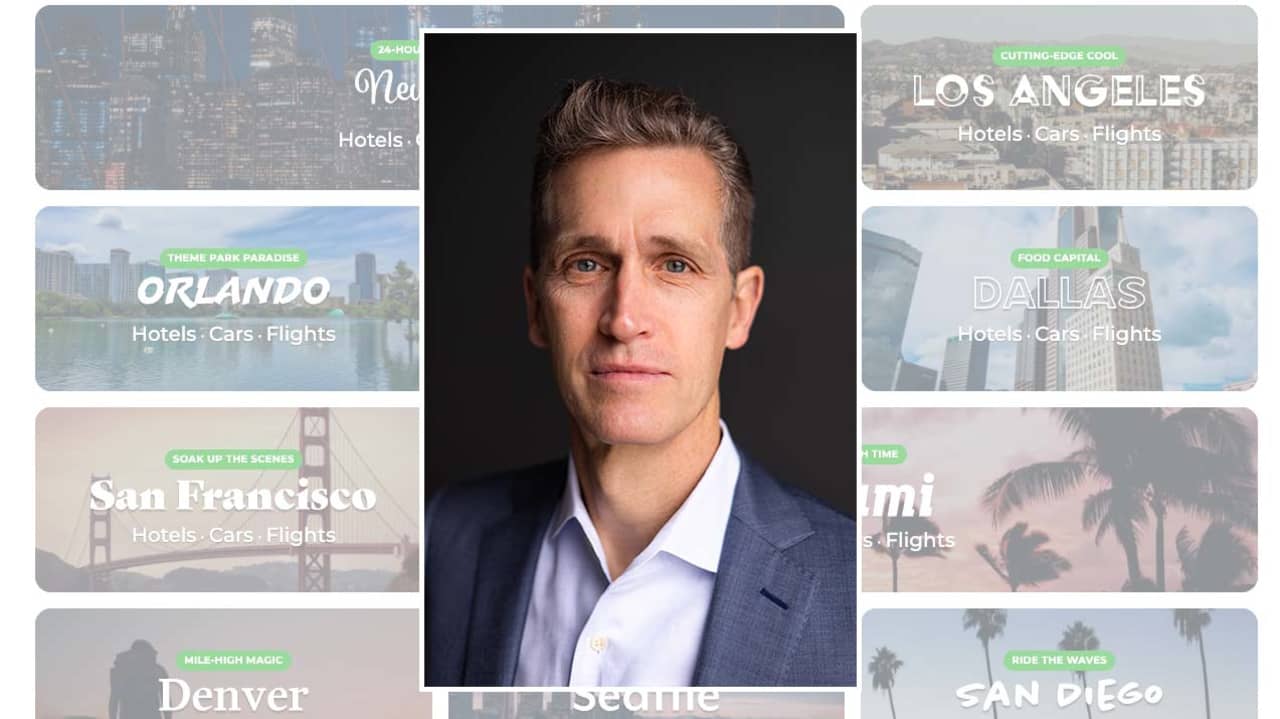AI Will Revolutionise How You Travel, Priceline CEO Says
With its 1997 launch as a name-your-own-price site, Priceline helped usher in the era of online travel booking―and the growth of a trillion-dollar category. Priceline itself has mushroomed into a global business with 1,500 full-time employees; along with global airline bookings, the site claims to offer 1.2 million accommodations in 116 countries.
Now, the Connecticut-based company is focusing on generative AI, and CEO Brett Keller is behind the leap. It’s just the latest technology push from Keller, a 25-year veteran of the company who has also served as CMO and COO. Under Keller, Priceline launched the travel industry’s first full-service mobile app in 2009; he also helped conceive the hugely popular William Shatner-fronted “Negotiator” ad campaign.
Keller, 56, talked to Penta about how AI is changing travel planning, what luxury travellers do to save money, and why Japan blows his mind.
Penta: Much of Priceline’s marketing is about value. Do you see luxury travellers in your customer mix along with budget-conscious travellers?
Brett Keller: High-net-worth consumers take a significantly higher number of trips than the average leisure traveller. For a high-end vacation like a safari in Tanzania, they’ll work with experts. But for the other 30 trips they book that year, either for themselves or family members, they don’t always reach for the stars. They want to manage money effectively. And as they’re moving around the country and the world, they need a fast, easy way to book travel that accommodates their needs. Priceline is a great platform for that kind of trip. And if you’re taking a quick weekend trip to Miami, and want to stay in the Four Seasons, we’ve negotiated with them. Even high-net-worth individuals seek value.
Priceline made headlines last year for partnering with both Google and OpenAI on Penny, your AI assistant. How has Penny evolved?
She’s gone from, “I can answer questions about the hotel you’re looking at” to actually servicing the customer through more complicated scenarios. If you need to cancel a hotel that’s fully refundable, you can do it with one click. But if there are issues, like a reservation that’s not fully cancelable, Penny can walk through those steps for you.
Penny’s also helping people find, search, and book properties. For example, if the customer tells her, “I’m looking for a great resort with these features, anywhere warm”—she’ll present recommended properties that meet those requirements. You can continue with Penny on the site, or go with the traditional experience.
Has there been any pushback from consumers about Penny and generative AI?
There has been none. Customers still have access to phone agents. Anyway, the younger generation doesn’t want to talk to anyone. And with traditional chat agents, live agents, or even messaging apps, there’s typically a delay. Penny answers immediately and in real time.
What’s the future of generative AI and online travel booking?
The future is a highly personalised shopping experience. It’s hard to achieve, because we don’t know about the consumer when they come in. But generative AI lets us dramatically improve personalisation. As you work with Penny, and tell us your preferences, the way you interact lets us find and book the best products and services every time you return. The ability to customise and personalise increases exponentially.
Is the travel experience even more bifurcated between elite, ultra-high-net-worth travellers and everyone else?
Consumers seem to be a little less sensitive in some areas. On planes, first-class and comfort-plus seats are the first to go, most of the time, and people are burning through points to sit in the front because they’re tired of not having legroom. But seats are packed in economy, too, so people are flying.
Hotel bookings are more economically driven in the U.S. Higher-income people are not as affected by interest rates or the cost of living, so they spend more freely than economy-minded consumers. There is a bit of bifurcation there. The low end is not filling, but the high end is.
It’s been reported Europe’s going to get even more crowded this summer. Does Priceline ever suggest alternatives to over-touristed or overpriced destinations?
We’re not in the business of telling you where you shouldn’t travel. We market popular destinations because that’s where people want to go. As much as we could tell people, “Las Vegas is overcrowded, don’t go,” people will want to go.
Social media is highlighting some overpopulated destinations and suggesting alternatives, so that comes back to us. But price is the No. 1 motivator. Vegas is a great value. There are so many hotel rooms available that you can go in a non-peak period and get a room in a four-star hotel for US$120. Try doing that in New York City.
What destinations are going to pop over the next year or two?
Asia will continue to be exciting and interesting to people. Bangkok is a great place to move in, then travel throughout Southeast Asia. As the region gets more popular, people will keep trying to find more remote and more unique destinations. People love Europe, but it was the hot spot in 2022 and ’23. Some travellers are saying, “I’ve had enough, and I’m moving on.” Japan is also amazing, for so many reasons. It’s easy to navigate. English is not a challenge. It’s safe. It feels like a different world, but completely first-world. The strength of the dollar is also driving some of that―again, price plays a role.
Beyond that, Mexico and the Caribbean took a real hit in 2022 and ’23 after a boom in 2021. They’re coming back now. A lot of people don’t want to travel far—“I just want to go to a beach and not think of anything.” And because not everyone wants to travel overseas, unique and relaxing cities like Nashville, Tennessee; Houston; and Austin, Texas, will be popular, especially into the fall.
Every day brings more headlines about airline woes. Who gets blamed if a Priceline customer has a bad flying experience, you or the airline?
When you have a bad experience traveling, you want to blame everybody. No matter what happened, the online travel agency takes blame and the airline takes the blame. It could be your seat, the person sitting next to you, whatever. We get the complaint, and we take on that responsibility and that role. We have leverage because of the amount of business we drive to partners. They want to work with us to make sure the customer has the best experience. Something goes wrong almost every time you take a trip. That’s just the reality.
What are your favourite places to travel?
My favourite destination, and a place where I spend a lot of time every summer, is [resort town] McCall, Idaho, one of the most beautiful towns in the West, with hiking, trails, and mountain biking. Outside of the country, it’s Japan, absolutely. Tokyo is the most exciting city in the world. It’s mind-blowing.
This interview has been edited for length and clarity.
 Copyright 2020, Dow Jones & Company, Inc. All Rights Reserved Worldwide. LEARN MORE
Copyright 2020, Dow Jones & Company, Inc. All Rights Reserved Worldwide. LEARN MORE
This stylish family home combines a classic palette and finishes with a flexible floorplan
Just 55 minutes from Sydney, make this your creative getaway located in the majestic Hawkesbury region.
The remote northern island wants more visitors: ‘It’s the rumbling before the herd is coming,’ one hotel manager says
As European hot spots become overcrowded , travellers are digging deeper to find those less-populated but still brag-worthy locations. Greenland, moving up the list, is bracing for its new popularity.
Aria Varasteh has been to 69 countries, including almost all of Europe. He now wants to visit more remote places and avoid spots swarmed by tourists—starting with Greenland.
“I want a taste of something different,” said the 34-year-old founder of a consulting firm serving clients in the Washington, D.C., area.
He originally planned to go to Nuuk, the island’s capital, this fall via out-of-the-way connections, given there wasn’t a nonstop flight from the U.S. But this month United Airlines announced a nonstop, four-hour flight from Newark Liberty International Airport in New Jersey to Nuuk. The route, beginning next summer, is a first for a U.S. airline, according to Greenland tourism officials.
It marks a significant milestone in the territory’s push for more international visitors. Airlines ran flights with a combined 55,000 seats to Greenland from April to August of this year, says Jens Lauridsen, chief executive officer of Greenland Airports. That figure will nearly double next year in the same period, he says, to about 105,000 seats.
The possible coming surge of travellers also presents a challenge for a vast island of 56,000 people as nearby destinations from Iceland to Spain grapple with the consequences of over tourism.
Greenlandic officials say they have watched closely and made deliberate efforts to slowly scale up their plans for visitors. An investment north of $700 million will yield three new airports, the first of which will open next month in Nuuk.
“It’s the rumbling before the herd is coming,” says Mads Mitchell, general manager of Hotel Nordbo, a 67-room property in Nuuk. The owner of his property is considering adding 50 more rooms to meet demand in the coming years.
Mitchell has recently met with travel agents from Brooklyn, N.Y., South Korea and China. He says he welcomes new tourists, but fears tourism will grow too quickly.
“Like in Barcelona, you get tired of tourists, because it’s too much and it pushes out the locals, that is my concern,” he says. “So it’s finding this balance of like showing the love for Greenland and showing the amazing possibilities, but not getting too much too fast.”
Greenland’s buildup
Greenland is an autonomous territory of Denmark more than three times the size of Texas. Tourists travel by boat or small aircraft when venturing to different regions—virtually no roads connect towns or settlements.
Greenland decided to invest in airport infrastructure in 2018 as part of an effort to expand tourism and its role in the economy, which is largely dependent on fishing and subsidies from Denmark. In the coming years, airports in Ilulissat and Qaqortoq, areas known for their scenic fjords, will open.
One narrow-body flight, like what United plans, will generate $200,000 in spending, including hotels, tours and other purchases, Lauridsen says. He calls it a “very significant economic impact.”
In 2023, foreign tourism brought a total of over $270 million to Greenland’s economy, according to Visit Greenland, the tourism and marketing arm owned by the government. Expedition cruises visit the territory, as well as adventure tours.
United will fly twice weekly to Nuuk on its 737 MAX 8, which will seat 166 passengers, starting in June .
“We look for new destinations, we look for hot destinations and destinations, most importantly, we can make money in,” Andrew Nocella , United’s chief commercial officer, said in the company’s earnings call earlier in October.
On the runway
Greenland has looked to nearby Iceland to learn from its experiences with tourism, says Air Greenland Group CEO Jacob Nitter Sørensen. Tiny Iceland still has about seven times the population of its western neighbour.
Nuuk’s new airport will become the new trans-Atlantic hub for Air Greenland, the national carrier. It flies to 14 airports and 46 heliports across the territory.
“Of course, there are discussions about avoiding mass tourism. But right now, I think there is a natural limit in terms of the receiving capacity,” Nitter says.
Air Greenland doesn’t fly nonstop from the U.S. because there isn’t currently enough space to accommodate all travellers in hotels, Nitter says. Air Greenland is building a new hotel in Ilulissat to increase capacity when the airport opens.
Nuuk has just over 550 hotel rooms, according to government documents. A tourism analysis published by Visit Greenland predicts there could be a shortage in rooms beginning in 2027. Most U.S. visitors will stay four to 10 nights, according to traveler sentiment data from Visit Greenland.
As travel picks up, visitors should expect more changes. Officials expect to pass new legislation that would further regulate tourism in time for the 2025 season. Rules on zoning would give local communities the power to limit tourism when needed, says Naaja H. Nathanielsen, minister for business, trade, raw materials, justice and gender equality.
Areas in a so-called red zone would ban tour operators. In northern Greenland, traditional hunting takes place at certain times of year and requires silence, which doesn’t work with cruise ships coming in, Nathanielsen says.
Part of the proposal would require tour operators to be locally based to ensure they pay taxes in Greenland and so that tourists receive local knowledge of the culture. Nathanielsen also plans to introduce a proposal to govern cruise tourism to ensure more travelers stay and eat locally, rather than just walk around for a few hours and grab a cup of coffee, she says.
Public sentiment has remained in favour of tourism as visitor arrivals have increased, Nathanielsen says.
—Roshan Fernandez contributed to this article.
This stylish family home combines a classic palette and finishes with a flexible floorplan
Just 55 minutes from Sydney, make this your creative getaway located in the majestic Hawkesbury region.





















